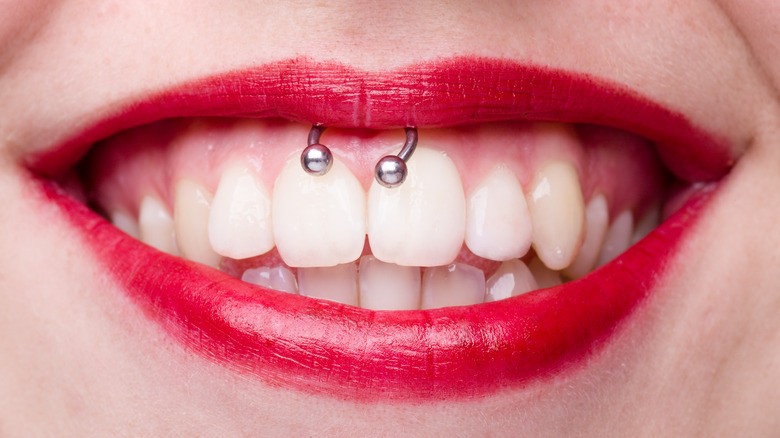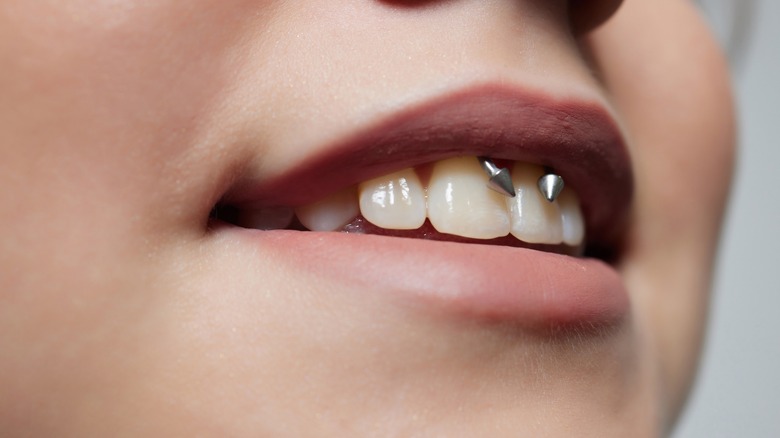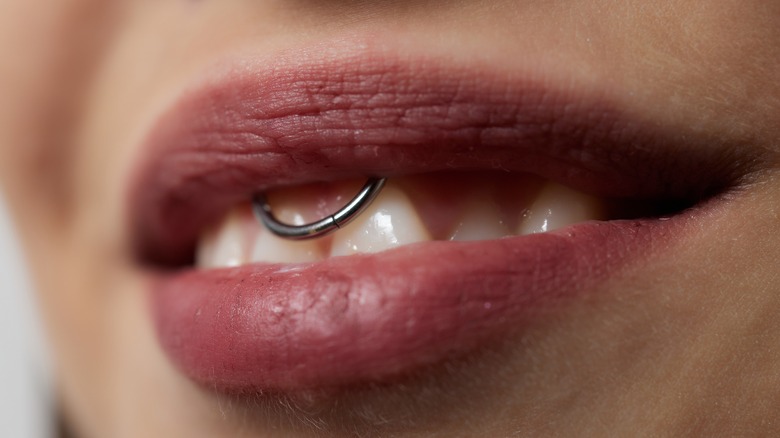Does A Smiley Piercing Damage Your Teeth?
When it comes to face piercing, the nose is the most popular for women (via Urban Body Jewelry). Tongue and lip piercings are next, particularly the labret — a piercing placed below the bottom of the lip and above the chin. The labret piercing is steeped in history in the ancient Americas (via Fashion History Timeline). Kathryn B. Bunn-Marcuse, associate professor of art history at the University of Washington, explained that it was a custom "initiated when a girl reached marriageable age, at which time her lower lip would be pierced with a pin." The labret piercing was eventually worn by all genders across the Americas and had a variety of meanings.
Nowadays, the labret is a fashion accessory and body modification. And lip piercings can vary far beyond this particular style, like the Medusa above the lip and the Madonna and Monroe to the side (via Fresh Trends). Then there's the Smiley, which goes through the frenulum — the tiny piece of skin that connects the upper lip to the gum (via Healthline). As cool as that sounds, is there a risk that a smiley piercing could damage your teeth?
Smiley piercings come with a potential risk
With piercings inside the mouth, there's always a risk of damaging your teeth and gums. In addition, your lips and mouth are constantly moving, increasing the potential to scratch or damage your teeth. If you've ever had braces, you'll know the feeling of the sharp ends of the wire scraping the inner lining of your cheek. Basically, metal and any part of your mouth aren't the greatest of combinations.
Like any piercing, there are risks of infection or rejection. But these are particularly heightened with a smiley piercing. Healthline notes that many bacteria can enter and gather in the mouth from eating and drinking, in addition to smoking, vaping, and even kissing. There's a chance that the constant friction between your piercing and gum could cause it to recede over time if a piercing is incorrectly placed. The same goes for your teeth, where the piercing can scrape away and permanently remove the enamel — the substance that protects your teeth from decay (via Colgate).
These are the things you should avoid after having a smiley piercing
Thankfully, the potential damage from a smiley piercing is preventable. First and foremost, you should research your piercer before you even consider getting it done. Not everyone can have this particular piercing (via Authority Tattoo), as not all frenulums are alike. If it's too thin, there's a higher chance your body will reject the piercing, or it could come loose on its own and tear the skin. A reputable piercer will not allow your frenulum to be pierced if it lacks the thickness and strength needed to hold the piercing.
Following aftercare instructions is necessary for any piercing to avoid infection and rejection. For piercings inside the mouth, this usually involves an antibacterial mouthwash or salt rinse (via WebMD). It would be best to avoid the temptation to move it, which is especially hard when you may absent-mindedly glide your tongue across it. Kissing is also a no-no for a while due to the risk of infection through bacteria. The same goes for smoking and vaping or drinking alcohol.
If you do notice any signs of infection, Authority Tattoo suggests seeking professional help from a doctor straight away so you can be prescribed antibiotics.


